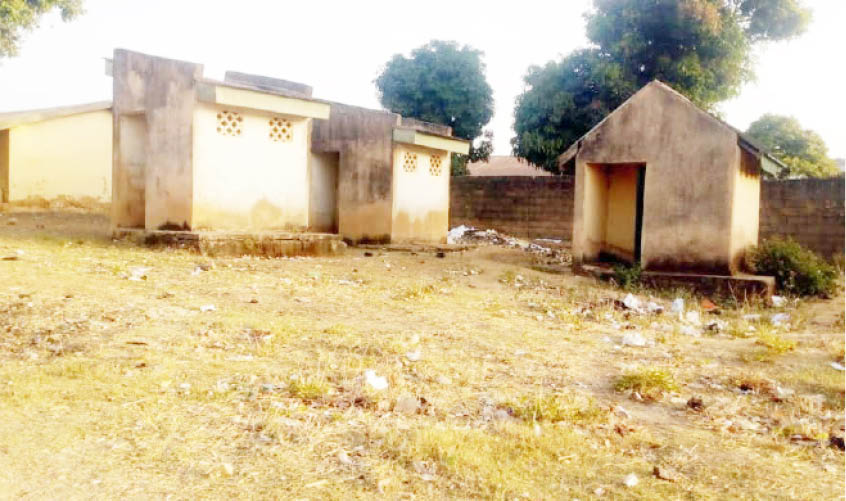The sanitation condition of basic schools in many areas poses a serious public health concern because millions of pupils do not have access to tolerable facilities to answer the call of nature.
Absence of decent toilets is believed to be interfering with attendance because pupils, especially girls, tend to return home to ease themselves during classes, with a high probability of not returning in most cases.
The issue of insufficient toilet facilities is so serious in some schools that pupils have to queue and wait longer than usual until it is their turn to access them.
The Universal Basic Education Commission (UBEC) said in its 2018 National Personnel Audit (NPA) report, launched by President Muhammadu Buhari that toilets are very important to schools because apart from guaranteeing hygiene and good health, they encourage attendance and reverse dropouts.
“It is probably for this reason that toilets are considered as one of the facilities that contribute to the creation of child-friendly schools,” the report said.
Unfortunately, the report further showed that 50 per cent of public primary schools did not have toilets, unlike private schools where 85 per cent have toilets. Many states have a low percentage of public primary schools with toilets. Plateau State, with 24 per cent has the lowest percentage of schools without toilets. Other states with less than 40 per cent of public schools with toilets are; Akwa Ibom, Ebonyi, Kogi, Nasarawa, Niger, Sokoto, Taraba and Zamfara, while Anambra, Katsina and Lagos are the only states with over 70 per cent of schools with toilets.
A female pupil of LEA Primary School, Zarmaganda, Jos, Plateau State, Simi Sati, said the pit toilets in her school are already filled up, mostly as a result of poor management. She said the situation forces her and many other pupils to defecate in the open especially “behind the classrooms and the school football field.”
Simi, who is in Primary 4 said the odour from the toilets is bad and a source of air pollution in some classrooms, depending on the wind direction.
According to her, the school management has said it would install flush toilets for pupils.
Another Primary 4 pupil of Anguwan Rogo Primary School, Jos, Fatima Musa, said toilets are not sufficient and more often than not, occupied leaving pupils waiting on the queue. She said toilet queues always make her feel sad.
“When I see the queue is long and it will take time to use the toilet, I run to the bush to ease myself. I feel unsafe going to the bush but I have no option,” she said.
On her part, Sadiya Salisu, a Primary 5 pupil of Sabon Layi Primary School, said the only toilet available for pupils was dilapidated.
“Apart from insufficient toilets, another disheartening issue is that the toilet available is unhygienic and I always feel insecure because there is no roof over the toilet,” she said.
A teacher in Yelwan Shendam, in Shendam Local Government Area who preferred anonymity, acknowledged that there use insufficient toilets in the schools in the area.
He said pupils prefer to defecate in the fields rather than queue for long to use the toilets available as they were not enough for a large number of pupils.
Owing to the large number pupils and their frequent trips into the bush to defecate, the learning process is affected in several ways, the teachers said, adding that the surrounding area is regularly polluted with excrement.
Also, a teacher in Jos North Local Government Area (LGA), said though there are few toilets in his school, pupils do not ease themselves in the open.
He said the school, which has over 3,000 pupils attending morning classes, only has three toilets and pupils have to wait for their turn to use it on first come first serve basis; in few instances, pupils disagree among themselves.
Kawaye Primary School in Anka LGA, Zamfara State, built in the mid-1970s, has been without toilet facility for long according to a teacher who said the ones built at inception have since collapsed.
“I graduated from the school in 1990 and even when I was there, there was no functioning toilet; years later, I came back as a teacher, still there are toilet facilities,” he said.
Pupils go back to their homes to ease themselves and some defecate in the bush, he said.
An official of the State Universal Basic Education Board (SUBEB) said sanitation facilities are in poor condition due to the challenge of ‘learner vandalism’, adding than more classrooms and toilets are being built in schools.
Another teacher in Danturai Primary School, Gusau, who craved anonymity, said the one-block of toilets in the school is over-stretched such that pupils have to defecate around the toilet building.
“The toilets are an eyesore as human excreta litter the place and some students, especially the senior ones, are very reluctant to use the toilets. The school has about 1,000 pupils,” he added.
In an interview, the State Commissioner of Education, Dr Ibrahim Abdullahi Gusau, said: “This is how Governor Bello Muhammad Matawalle’s administration met education in the state. That is why he appropriated 20 per cent of the state’s annual budget to the education sector. We are working round the clock to revive the ailing sector.
“Part of our action plan is the reconstruction and renovation of dilapidated structures in our schools.”
In Taraba State, the situation is said to be worse in basic schools located in distant areas where facilities for effective learning are difficult to come by.
At Muhammadu Nya Primary School, Hassan Primary School and Central Primary School in Jalingo, there are no decent facilities for excreta disposal. The available toilets are either blocked or filthy due to insufficient water supply, forcing pupils to defecate outside.
A teacher, Mallam Muhammad Imran, said there are over 1,000 pupils in his school but only three pit toilets are available for them and the teachers to use.
He said the government has assured schools that modern facilities would be provided for learning.
Ebonyi State is in the same situation as Taraba with inadequate provision of sanitation facilities in public schools. There are also dilapidated buildings in some public schools.
It was observed that Day secondary and primary schools are worse hit in the state.
A native of Okposi Community, Ohanzara LGA, who gave his name as Prince said schools in the area have poor toilets.
“These include Government Day Secondary School, Okposi, Isi-Okposi and Ezi-Okposi High School and many others. The same thing is applicable to primary schools in my area,” he said.
In Afikpo North and South, the story is the same. Mr Ndubuisi (second name withheld) said Amasiri Community School along the popular Okigwe Road, the Government Secondary School among others in the area are without functional toilets.
An SSS 1 student of Urban Modern Secondary School, Abakaliki, Kosi Jude, said all the toilets in the school are dirty.
“I have never used the school toilets not because they are unclean but because students defecate and urinate on the floor instead of using the WC. Many of us do not use it, we go to the bush,” she added.
The chairman, Ebonyi SUBEB, Chief Hyacinth Ikpor, said: “Though there are challenges in school sanitation in some places, most of our schools have toilets.”
In Minna, Niger Sate, some of the schools visited such as Waziri Nursery and Primary School, Muazu Sarkin Yaki Nursery and Primary School and Usman Nagogo Primary School have toilets but they are not in use.
Muazu Sarkin Yaki School located on Bosso Road boasts of imposing classroom structures but the two-room toilet facility is inadequate for the pupils and also in deplorable condition.
It was noticed that part of the outer wall is cracked so it was locked up altogether.
Also, the toilets at Usman Nagogo School are abandoned. One of the two facilities is under lock and key, another made of red bricks bore tales of decay and deterioration that had set in overtime. Used plastic and leather materials littered the interior, while what used to be a passage was covered with excrement and urine.
For Waziri Nursery and Primary Schools the two toilets are also abandoned with no alternative.
Some of the teachers who spoke on condition of anonymity said there is hardly adequate toilet for both pupils and staff across primary schools in the state, adding that the development was a health concern to them.
Teachers have to go outside their schools to ease themselves, while the pupils used open spaces around the schools to do so.
A deputy director at the Ministry of Education said the government was gradually solving the problem of poor sanitation and waste management in schools.

 Join Daily Trust WhatsApp Community For Quick Access To News and Happenings Around You.
Join Daily Trust WhatsApp Community For Quick Access To News and Happenings Around You.


